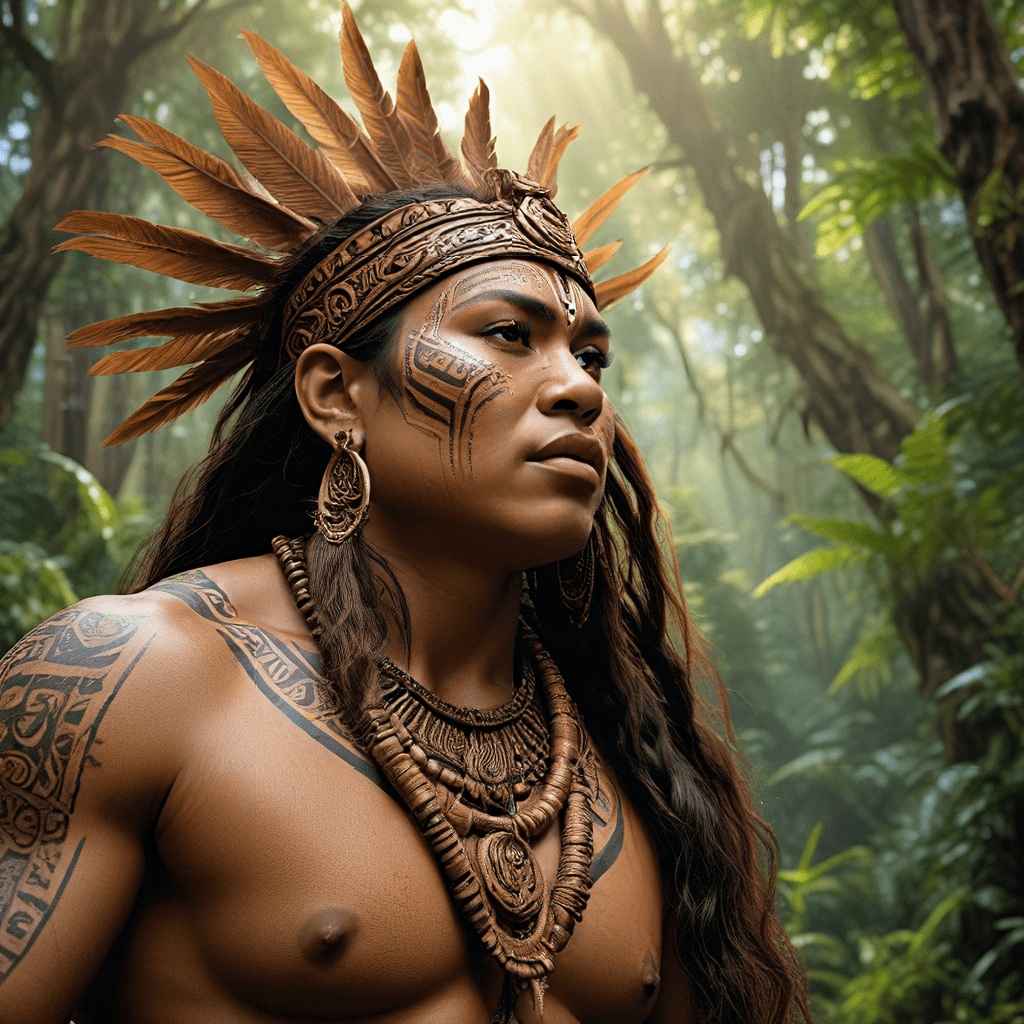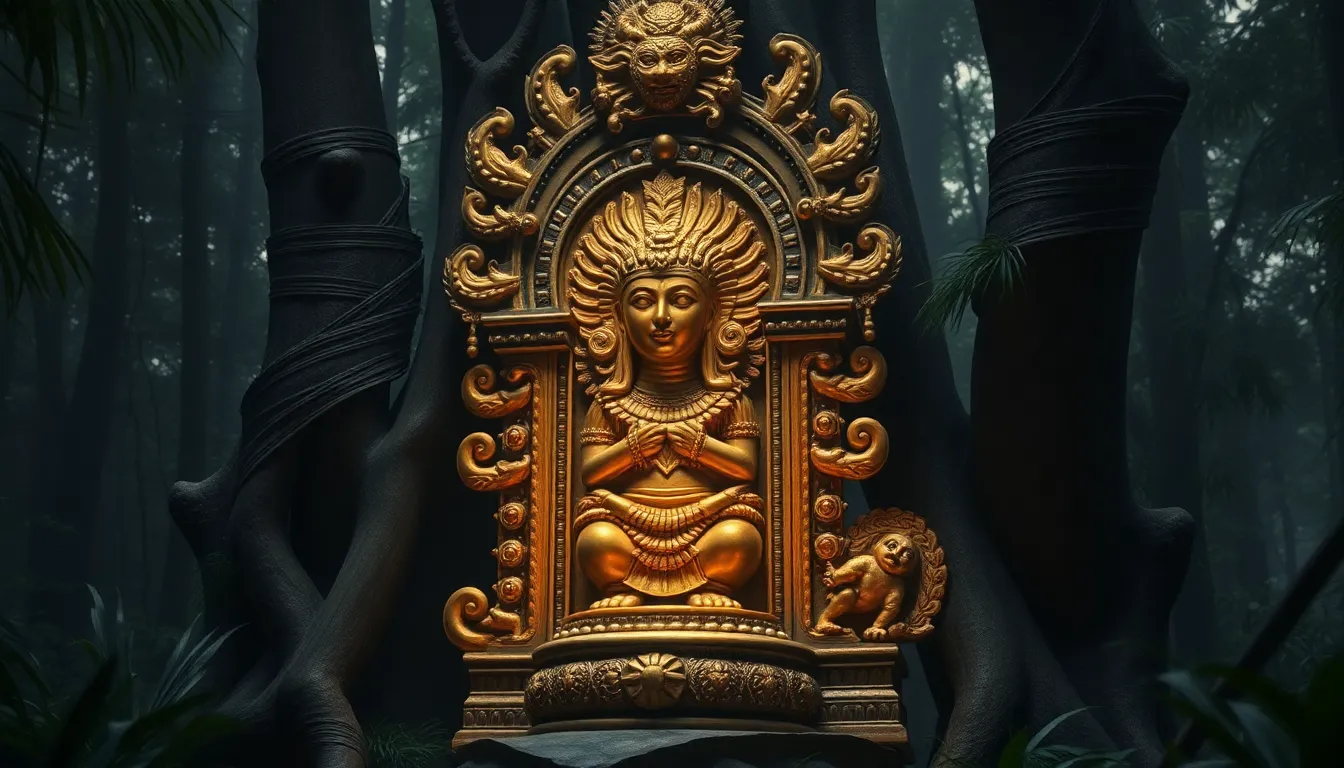Maori Creation Myth: The Birth of the World
The Maori people of New Zealand have a rich and complex mythology that has played a vital role in shaping their relationship with the natural world. Their creation myth, known as “Te Kore” describes the birth of the world and its inhabitants. At the beginning, there was only darkness, emptiness, and stillness. Then, from the void, emerged the primordial gods, who gave birth to the land, sea, and skies, as well as the first humans. This story is not just a mythological tale; it is a framework for understanding the interconnectedness of every living thing and humankind’s responsibility to care for it.
Tāne Mahuta: Guardian of the Forest
One of the most important figures in Maori mythology is Tāne Mahuta, the god of the forest. He is often depicted as a powerful warrior who fought with his brothers to free his mother, Papatūānuku, the Earth Mother, from the embrace of Ranginui, the Sky Father. After pushing his father into the sky, Tāne Mahuta took on the responsibility of caring for the forests. He planted the first trees and nurtured them until they grew strong and tall. He teaches that forests are sacred and must be revered and respected. His responsibility to care for the forests foreshadows the importance of environmental stewardship in Maori culture.
The Interconnectedness of All Things
Maori mythology emphasizes the deep interconnectedness of all living things. All beings – humans, plants, animals, and even the elements of nature – are seen as part of one large family. This concept is often expressed through the term "whanaungatanga," which emphasizes the importance of kinship, responsibility, and the shared destiny of all living things. The earth, oceans, mountains, and all creatures within are deeply intertwined. This understanding underpins the importance of respecting and caring for the environment.
Rongo and the Importance of Agriculture
Rongo is the god of peace, cultivation, and abundance. He is responsible for the growth of crops and the prosperity of the land. He symbolizes the importance of agriculture and the need to cultivate the land with care and respect. Maori beliefs emphasize sustainability and a deep understanding of natural cycles. The connection between humans and the land is vital for their survival and well-being, and the god Rongo is a powerful reminder of this.
Tangaroa and the Respect for the Sea
Tangaroa, the god of the sea, represents the vastness and power of the ocean. He is the creator of all sea creatures and the source of sustenance for many people. The Maori respect the ocean and its creatures, recognizing their profound interconnectedness. The importance of fishing sustainably and respecting the balance of the marine ecosystem is vital for the health and well-being of both humans and the environment.
The Concept of Mana and Environmental Responsibility
The concept of "mana" is central to Maori understanding of the environment. Mana is a spiritual force that imbues all things, both animate and inanimate, with power and authority. It is a sacred energy that connects all living beings and the natural world. The responsibility to care for the environment stems from the belief that all things have mana and that humans have a duty to respect and protect this sacred energy. When a person acts in harmony with nature, they gain mana, and when they disrespect it, they lose mana. This belief system promotes a sense of responsibility and accountability for the well-being of the environment.
The Role of Tapu and Noa
"Tapu" and "noa" are two important concepts in Maori culture that have implications for environmental practices. Tapu means "sacred" or "forbidden," and it is often used to protect areas of environmental significance. Noa means "common" or "ordinary," signifying places or actions that are not subject to the same restrictions. Tapu places are considered sacred and are protected from disturbance. By setting aside certain areas as tapu, the Maori ensured the preservation and longevity of crucial resources such as forests, rivers, and sacred sites. This practice of setting aside tapu areas demonstrates the Maori understanding of the importance of conservation and their commitment to preserving the natural world for future generations.
The Impact of Colonization on Traditional Practices
The arrival of European colonists in New Zealand had a profound impact on Maori culture and traditional environmental practices. The introduction of new agricultural practices, deforestation, and the exploitation of natural resources led to significant environmental degradation. Many traditional practices, such as the concept of tapu, were undermined by European laws and policies. This resulted in the loss of knowledge, skills, and cultural practices that had sustained Maori society for centuries. However, despite these challenges, Maori have continued to advocate for the protection of their environment and have sought to revive traditional practices in order to ensure the long-term health and sustainability of their land.
Modern Applications of Maori Mythology in Conservation
In recent years, there has been a growing recognition of the importance of incorporating Maori knowledge and values into environmental conservation efforts. Maori mythology and traditional practices provide valuable insights into sustainable living and ecological stewardship. Modern environmental initiatives, such as the development of community-based conservation programs and the use of traditional ecological knowledge in managing natural resources, draw inspiration from Maori beliefs and practices. For example, the concept of "kaitiakitanga," or guardianship, has become a core principle in many modern conservation projects. This approach emphasizes the responsibility of caring for the environment for future generations.
The Future of Maori Environmentalism
The future of Maori environmentalism is promising. Maori communities continue to play a vital role in advocating for the protection of their environment and promoting sustainable practices. Through their continued commitment to their cultural heritage, Maori are demonstrating the power of their traditions to inspire and guide environmental efforts. The integration of Maori values and knowledge into conservation initiatives is essential in finding solutions to the environmental challenges facing New Zealand and the world. By embracing traditional practices and seeking to maintain a balance between human needs and the health of the environment, Maori are paving the way for a more sustainable and equitable future.
FAQ
Q: How do the Maori creation myths relate to environmental conservation?
A: The Maori creation myths highlight the interconnectedness of all living things and the responsibilities of humans to care for the environment. Their belief in the earth as a mother figure and the stories about the gods who created and protected nature emphasize the importance of respect and stewardship.
Q: What are some examples of traditional Maori practices that promote environmental conservation?
**A: ** Tapu, the concept of sacredness, is used to protect areas of environmental significance, while Rongo, the god of agriculture, symbolizes the importance of sustainable practices. The emphasis on whanaungatanga, kinship, highlights the deep relationship between humans and the natural world.
Q: How have European colonization impacted Maori environmental practices?
A: Colonization disrupted traditional practices, leading to the loss of valuable knowledge and skills. The introduction of new agricultural methods and exploitation of natural resources caused significant environmental degradation.
Q: How is Maori mythology being incorporated into modern conservation efforts?
A: The principles of kaitiakitanga, guardianship, and the respect for mana are being applied in conservation projects. The integration of traditional ecological knowledge into resource management strategies is becoming increasingly important.
Q: What is the future of Maori environmentalism?
A: The future of Maori environmentalism is promising as communities continue to advocate for the protection of their environment and promote sustainable practices. The integration of traditional values and knowledge into conservation efforts provides a valuable roadmap for a more sustainable future.



